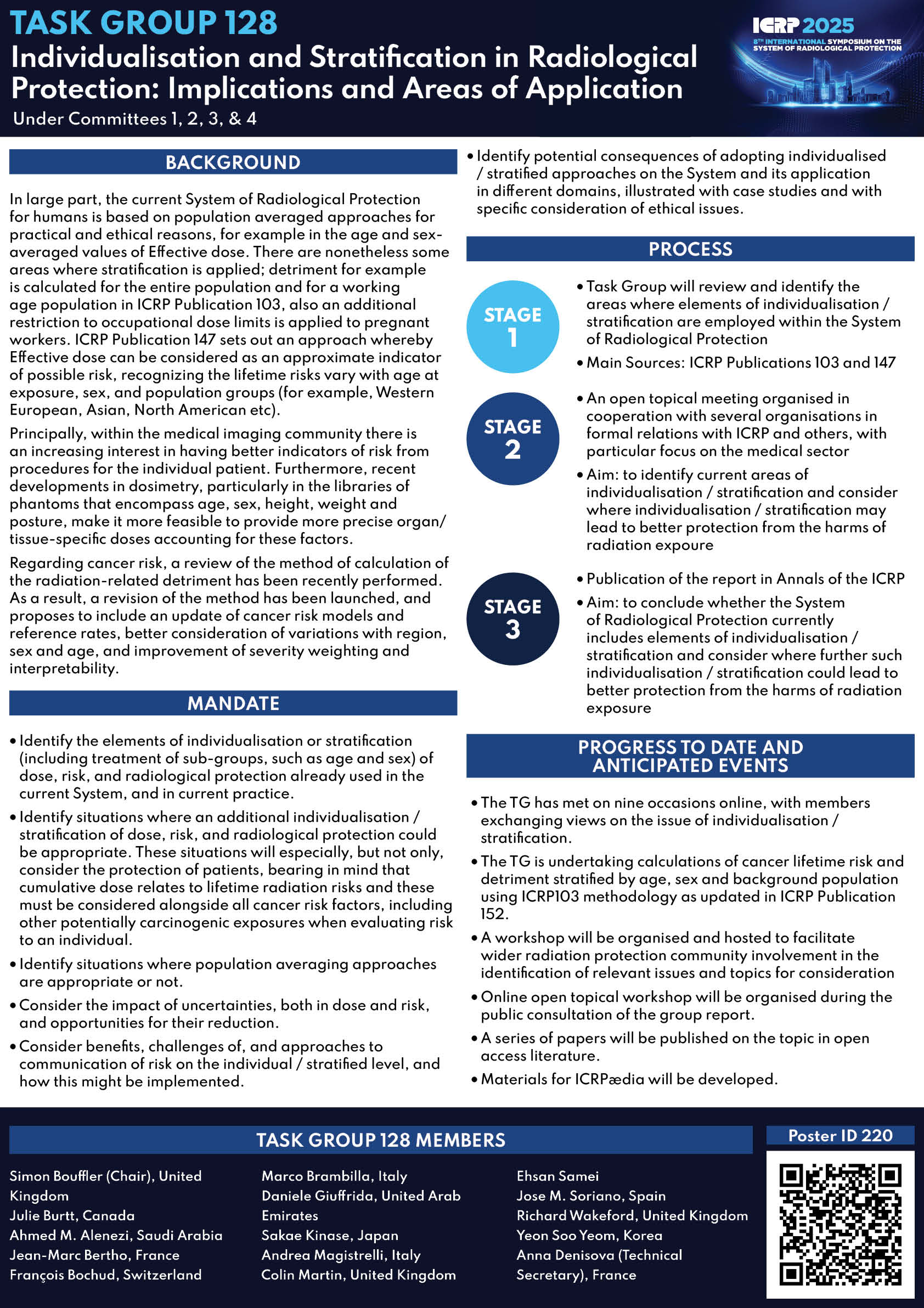Task Group 128
Individualisation and Stratification in Radiological Protection: Implications and Areas of Application
Under Committee 1 and Committee 2 and Committee 3 and Committee 4
Background
In large part, the current System of Radiological Protection for humans is based on population averaged approaches for practical and ethical reasons, for example in the age- and sex-averaged values of Effective dose. There are nonetheless some areas where stratification is applied; detriment for example is calculated for the entire population and for a working age population in ICRP Publication 103, also an additional restriction to occupational dose limits is applied to pregnant workers. ICRP Publication 147 sets out an approach whereby Effective dose can be considered as an approximate indicator of possible risk, recognizing the lifetime risks vary with age at exposure, sex, and population groups (for example, Western European, Asian, North American etc). Principally, within the medical imaging community there is an increasing interest in having better indicators of risk from procedures for the individual patient. Furthermore, recent developments in dosimetry, particularly in the libraries of phantoms that encompass age, sex, height, weight and posture make it more feasible to provide more precise organ/tissue-specific doses accounting for these factors. Regarding cancer risk, a review of the method of calculation of the radiation-related detriment has been recently performed. As a result, a revision of the method has been launched, and proposes to include an update of cancer risk models and reference rates, better consideration of variations with region, sex and age, and improvement of severity weighting and interpretability.
Mandate
Given the above background considerations and the evolving work being conducted within Task Group 111 on Factors Governing the Individual Response of Humans to Ionising Radiation, it is timely to consider whether and for which situations the system of protection should adopt a more individualised/stratified approach, particularly when considering low dose, low dose-rate and chronic exposures. Therefore, this Task Group is mandated to:
- Identify the elements of individualisation or stratification (including treatment of sub-groups, such as age and sex) of dose, risk, and radiological protection already used in the current System, and in current practice.
- Identify situations where an additional individualisation / stratification of dose, risk, and radiological protection could be appropriate. These situations will especially, but not only, consider the protection of patients, bearing in mind that cumulative dose relates to lifetime radiation risks and these must be considered alongside all cancer risk factors, including other potentially carcinogenic exposures when evaluating risk to an individual.
- Identify situations where population averaging approaches are appropriate or not.
- Consider the impact of uncertainties, both in dose and risk, and opportunities for their reduction.
- Consider benefits, challenges of, and approaches to communication of risk on the individual/stratified level, and how this might be implemented.
- Identify potential consequences of adopting individualised/stratified approaches on the System and its application in different domains, illustrated with case studies and with specific consideration of ethical issues.
Process
As a first step, the Task Group will review and identify the areas where elements of individualisation/stratification are employed within the system of protection, largely from ICRP Publications 103 and 147. The second step is expected to be an open topical meeting organised in cooperation with several organisations in formal relations with ICRP and others, with a particular focus on the medical sector. This dedicated meeting will serve to further identify current areas of individualisation/stratification and consider where individualisation/stratification may lead to better protection from the harms of radiation exposure.
The Task Group will hold regular meetings, largely by web-conference to deliberate on the relevant issues and draft a report to the MC suitable for publication in the Annals of ICRP. To allow full discussion of the issues, two face-to-face meetings are anticipated. The Task Group will keep abreast of developments of the work of other relevant ICRP Task Groups.
Deliverables
The Task Group will develop a report for publication in Annals of the ICRP that defines where the system of protection currently includes elements of individualisation/stratification and considers where further such individualisation/stratification could lead to better protection from the harms of radiation exposure. The Task Group is also encouraged to publish on progress as it develops through open literature publications.
A workshop will also be organised and hosted to facilitate wider radiation protection community involvement in the identification of relevant issues and topics for consideration; this is anticipated to be held online at an early stage of the TGs work.
In addition, the Task Group will develop materials suitable for ICRPædia in collaboration with the Scientific Secretariat.
ICRP 2025 Poster
| Simon Bouffler (Chair), Imperial College London, United Kingdom | ||
| Julie Burtt (Member), Canadian Nuclear Safety Commission, Canada | ||
| Ahmed M. Alenezi (Member), Nuclear and Radiological Regulatory Commission, Saudi Arabia | ||
| Jean-Marc Bertho (Member), ASNR, France | ||
| François Bochud (Member), Lausanne University Hospital and Unversity of Lausanne, Switzerland | ||
| Marco Brambilla (Member), European Federation of Organizations for Medical Physics, EFOMP, Italy | ||
| Daniele Giuffrida (Member), Federal Authority for Nuclear Regulation (FANR), United Arab Emirates | ||
| Sakae Kinase (Member), Japan Atomic Energy Agency (JAEA)/ Ibaraki University, Japan | ||
| Andrea Magistrelli (Member), Children's Hospital Bambino Gesu' IRCCS, Italy | ||
| Colin Martin (Member), University of Glasgow, United Kingdom | ||
| Ehsan Samei (Member), | ||
| Jose M. Soriano (Member), Spain | ||
| Richard Wakeford (Member), The University of Manchester, United Kingdom | ||
| Yeon Soo Yeom (Member), Yonsei University, Korea | ||
| Anna Denisova (Technical Secretary), France | ||
| Marco Brambilla (Representative), European Federation of Organizations for Medical Physics, EFOMP, Italy | ||
| Heloisa Fonseca (Representative), International Atomic Energy Agency, |
